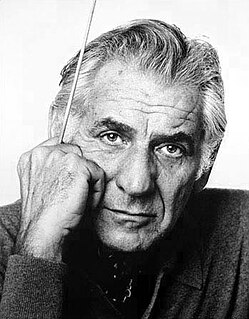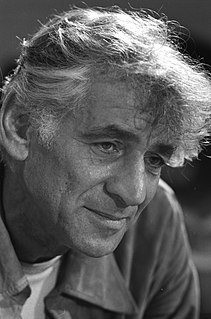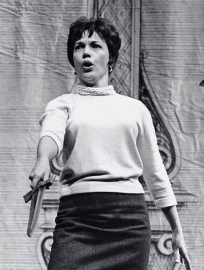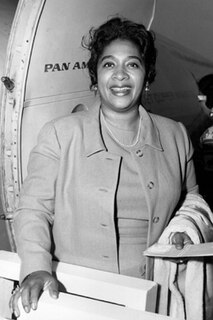Related Research Articles

Leonard Bernstein was an American conductor, composer, pianist, music educator, author, and humanitarian. Considered to be one of the most important conductors of his time, he was the first American conductor to receive international acclaim. According to music critic Donal Henahan, he was "one of the most prodigiously talented and successful musicians in American history". Bernstein was the recipient of many honors, including seven Emmy Awards, two Tony Awards, sixteen Grammy Awards, including the Lifetime Achievement, and the Kennedy Center Honor.

Trouble in Tahiti is a one-act opera in seven scenes composed by Leonard Bernstein with an English libretto by the composer. It is the darkest among Bernstein's "musicals", and one of only two for which he wrote the words and the music. Trouble in Tahiti received its first performance on 12 June 1952 at Bernstein's Festival of the Creative Arts on the campus of Brandeis University in Waltham, Massachusetts, to an audience of nearly 3,000 people. The NBC Opera Theatre subsequently presented the opera on television in November 1952, a production which marked mezzo-soprano Beverly Wolff's professional debut in the role of Dinah. Wolff later reprised the role in the New York City Opera's first staging of the work in 1958. The original work is about 40 minutes long.

A Quiet Place is a 1983 American opera with music by Leonard Bernstein and a libretto by Stephen Wadsworth. It is a sequel to Bernstein's 1951 opera Trouble in Tahiti.
John M. McCollum was an American tenor who had an active singing career in operas, concerts, and recitals during the 1950s through the 1970s. As an opera singer he performed with companies throughout North America, mostly working with second tier opera houses. He was much more successful as a singer of oratorios and other works from the concert repertoire, and enjoyed a particularly productive and lengthy relationship with the Boston Symphony Orchestra. As a concert singer he sang a wide repertoire but drew particular acclaim for his performances in the works of Johann Sebastian Bach and George Frideric Handel.
Patricia Neway was an American operatic soprano and musical theatre actress who had an active international career during the mid-1940s through the 1970s. One of the few performers of her day to enjoy equal success on both the opera and musical theatre stages, she was a regular performer on both Broadway and at the New York City Opera during the 1950s and 1960s.
Paul Seiko Chihara is an American composer.
(Frank) Neely Bruce is an American composer, conductor, pianist, and scholar of American music. He is the composer of over 800 works including three full-length operas. Currently, he is John Spencer Camp Professor of Music and American Studies at Wesleyan University, where he has taught since 1974.

Beverly Wolff was an American mezzo-soprano who had an active career in concerts and operas from the early 1950s to the early 1980s. She performed a broad repertoire which encompassed operatic and concert works in many languages and from a variety of musical periods. She was a champion of new works, notably premiering compositions by Leonard Bernstein, Gian Carlo Menotti, Douglas Moore, and Ned Rorem among other American composers. She also performed in a number of rarely heard baroque operas by George Frideric Handel with the New York City Opera (NYCO), the Handel Society of New York, and at the Kennedy Center Handel Festivals.
James Billings 1932-2022 was an American operatic baritone, librettist, and opera director. He began his career in the late 1950s in Boston and later became a member of the New York City Opera where he performed regularly from the early 1970s through the 1990s. A specialist in the comprimario repertoire, he has portrayed more than 175 opera roles on stage during his long career. Billings has also written librettos for numerous operas for children and since the mid-1990s has directed several opera productions.
Mark Bucci was an American composer, lyricist, and dramatist. Influenced by Giacomo Puccini, his work is composed in a contemporary yet lyrical style, which frequently employs marked rhythms and memorable harmonies and melodies.
Jean Kraft was an American operatic mezzo-soprano. She began her career singing with the New York City Opera (NYCO) during the early 1960s, after which she embarked on a partnership with The Santa Fe Opera from 1965 through 1987. In 1970 she joined the roster of singers at the Metropolitan Opera in New York City where she remained a fixture until 1989. She also performed as a guest of many other opera companies throughout the United States. In 2005 Opera News called her "a gifted mezzo and observant, imaginative actress who lent distinction to a wide range of character roles. By the end of her Met tenure, she had sung nearly 800 performances and become a solid audience favorite."

Betty Allen was an American operatic mezzo-soprano who had an active international singing career during the 1950s through the 1970s. In the latter part of her career her voice acquired a contralto-like darkening, which can be heard on her recording of Sergei Prokofiev’s Alexander Nevsky with conductor Eugene Ormandy and the Philadelphia Orchestra. She was known for her collaborations with American composers, such as Leonard Bernstein, Aaron Copland, David Diamond, Ned Rorem, and Virgil Thomson among others.
Eunice Alberts (1927–2012) was an American contralto who had an active career as a concert soloist and opera singer during the 1950s through the 1980s.
Arnold U. Gamson was an American conductor who is particularly known for his work within the field of opera. He notably co-founded and served as the Music Director and principal conductor of the American Opera Society from 1950-1960. His work with the AOS was highly influential in sparking and perpetuating the post-World War II bel canto revival, particularly through a number of highly lauded productions of rarely heard works by Gioachino Rossini and Vincenzo Bellini. He is the husband of renowned dancer and choreographer Annabelle Gamson. Their daughter, Rosanna Gamson, is also a celebrated choreographer and their son, David Gamson is composer of platinum-selling popular songs.

Beverly Bower was an American operatic soprano who had an active international opera career from the mid-1950s through the early 1970s. She began her opera career at the New York City Opera where she sang between 1956 and 1963. She later worked mainly as a freelance artist with important opera companies throughout the United States and with a few opera companies in Europe.
William Chapman was an American operatic baritone and stage actor. He appeared in several Broadway productions and was notably a leading performer at the New York City Opera from 1957 through 1979.
Lee Venora is an American operatic soprano and musical theater actress. She was highly active with the New York City Opera between 1957 and 1967 and a regular performer at the San Francisco Opera between 1961 and 1966. She also appeared in a few Broadway musicals, Lincoln Center revivals, and national tours of musicals during her career. Composer and conductor Leonard Bernstein was an admirer of her voice, and she performed with him and the New York Philharmonic on a number of occasions during the late 1950s and early 1960s. She also sang with the orchestra on a couple of recordings and appears on a few musical recordings as well.
Michael Pollock was an American operatic tenor, opera director, and voice teacher. He notably worked as both a performer and director at the New York City Opera during the 1940s and 1950s.

James Pease was an American bass-baritone, notable for his Wagnerian roles. He was also a distinguished Balstrode in Benjamin Britten’s Peter Grimes, a role which he was the first to perform in the US in 1946, and later recorded under the composer’s direction in 1958.
David Anthony Stuart Atkinson was a Canadian baritone and New York Broadway actor/singer. Most of his career was spent performing in musicals and operettas in New York City from the late 1940s through the early 1970s, although he did appear in some operas and made a few television appearances. In 1952 he created the role of Sam in the world premiere of Leonard Bernstein's Trouble in Tahiti. From 1956-1962 he was a leading performer at the New York City Opera where he starred in several musicals and appeared in the world premieres of several English language operas. His greatest success on the stage came late in his career: the role of Cervantes in Man of La Mancha which he portrayed in the original Broadway production, the 1968 national tour, and in the 1972 Broadway revival.
References
- 1 2 3 "Music: Death in the Afternoon". Time . August 19, 1957. Archived from the original on November 1, 2011. Retrieved September 30, 2009.
- 1 2 Edward Downes (August 6, 1957). "Opera: 'Tale for a Deaf Ear'; New work by Bucci is sung at Tanglewood". The New York Times . Retrieved May 20, 2009.
- 1 2 Howard Taubman (April 7, 1958). "Double Bill of Marital Strife; Bucci and Bernstein Works at Center". The New York Times . Retrieved May 20, 2009.
- ↑ www.operaamerica.org https://www.operaamerica.org/applications/NAWD/newworks/details.aspx?id=1350 . Retrieved 2017-11-09.
{{cite web}}: Missing or empty|title=(help) - ↑ "TROUBLE IN TAHITI + THE TELEPHONE + TALE FOR A DEAF EAR - Opera d'arte". University of Cincinnati. Retrieved 2017-11-09.